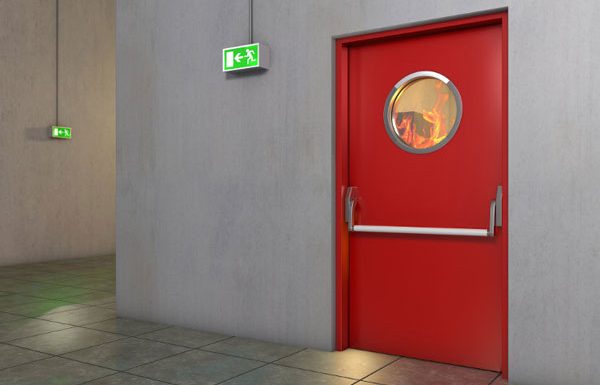
The garage is often the last place people think about when it comes to fire safety. However, with all the flammable materials in your garage and the fact that it’s usually located close to other structures, fires can spread quickly from your car or boat into your home or neighbor’s house. The best way to prevent this type of damage is by installing a fire-rated door on your garage door.
How a Fire-Rated Door Protects You
A fire-rated door is a door that has been tested to meet the requirements of UL 723, the industry standard for door and frame assemblies designed to protect occupants from exposure to smoke and flame for a prescribed time period.
A fire-rated door will be labeled with a label stating it meets UL standards and have other identifying markings. It’s also important that you know where your garage is located within your home so that you can direct emergency personnel in case of an emergency.
Fire-Rated Doors Ensure Safety
Fire-rated doors are designed to keep the heat and smoke from spreading into your house.
A fire-rated door is a door that has been tested to meet specific fire protection standards. The door provides a barrier between the garage and your residence, keeping the heat and smoke from spreading into the home. This means you’re protected if there’s an accidental ignition inside your garage or an electrical problem with your car. Fire-rated doors can also help protect against fires that spread outside of garages and other areas of your home where they may not be needed (such as kitchens).
When choosing a new garage door for your home, be sure it includes a fire-rated option to ensure safety in this important space!
Finding the Right Door for Your Garage
The right garage door for your home or business can make all the difference in keeping your garage safe from unwanted intruders. A fire-rated garage door will give you peace of mind that the flames can’t spread into your home or business if there is a fire.
A fire-rated garage door is one that an independent laboratory has tested to meet specific standards set by UL. The door must withstand temperatures up to 1,400 degrees Fahrenheit and resist flames for at least 15 minutes without sustaining any damage.
When selecting a fire-rated garage door, there are several factors you should consider:
- The size of the opening where it will be installed (the width, height and depth)
- If it’s going over an existing opening or needs additional framing support
- Any obstructions near where its located, such as trees or other buildings
A Door That Keeps You Safe
A fire-rated door meets the requirements of the Underwriters Laboratories (UL) and the National Fire Protection Association (NFPA). This means that it will keep you safe in a fire. A fire-rated door will help prevent flames from spreading into the home. If there is an explosion or other accident involving flammable materials, it will reduce the likelihood of your home catching on fire.
A garage door is one of the most common ways for fires to start, so many states require all doors leading from garages into homes to have a rating from UL or NFPA. The law applies to new construction and when existing homes are remodeled or renovated. If you’re unsure whether your garage door has been installed according to code requirements and would like to ensure that it meets those standards, get in touch with us today!
What Makes a Fire-Rated Door?
A fire-rated door is not the same as a fire-resistant door. Fire-resistant doors, which you may have seen in hospitals and high-rise buildings, are designed to slow down or prevent flames from entering a room. Fire-rated doors are tested for specific types of fires. For example, an opening that allows smoke to pass through but does not allow flames to pass through.
A fire-rated door will have a label indicating how many minutes it can withstand certain temperatures and rates of heat gain before failing. The most common test for determining this rating is UL 10C (for single-leaf applications). Still, other standards exist as well, such as NFPA 80, NFPA 101 (which focuses on commercial uses) and NFPA 72 (which focuses on residential uses).
The cost difference between these two options can be significant; however, there may be other factors that affect your decision making process when choosing between them, such as location within the house/building (will it be visible?), existing construction materials used throughout the home/building (are they likely to burn more easily than others?). In addition, state building codes may mandate one over another depending upon whether installed during new construction or remodeling projects respectively.
Conclusion
The last thing you want is for your garage to catch on fire. But with the right door, you can rest assured that it won’t be a problem. Fire-rated doors are made to withstand the heat and flame from a blaze without allowing smoke or other fumes into the home or business. They also contain heavy-duty materials like steel or concrete. So if you do have an emergency and need to escape quickly, these doors will provide extra protection during your escape plan.

